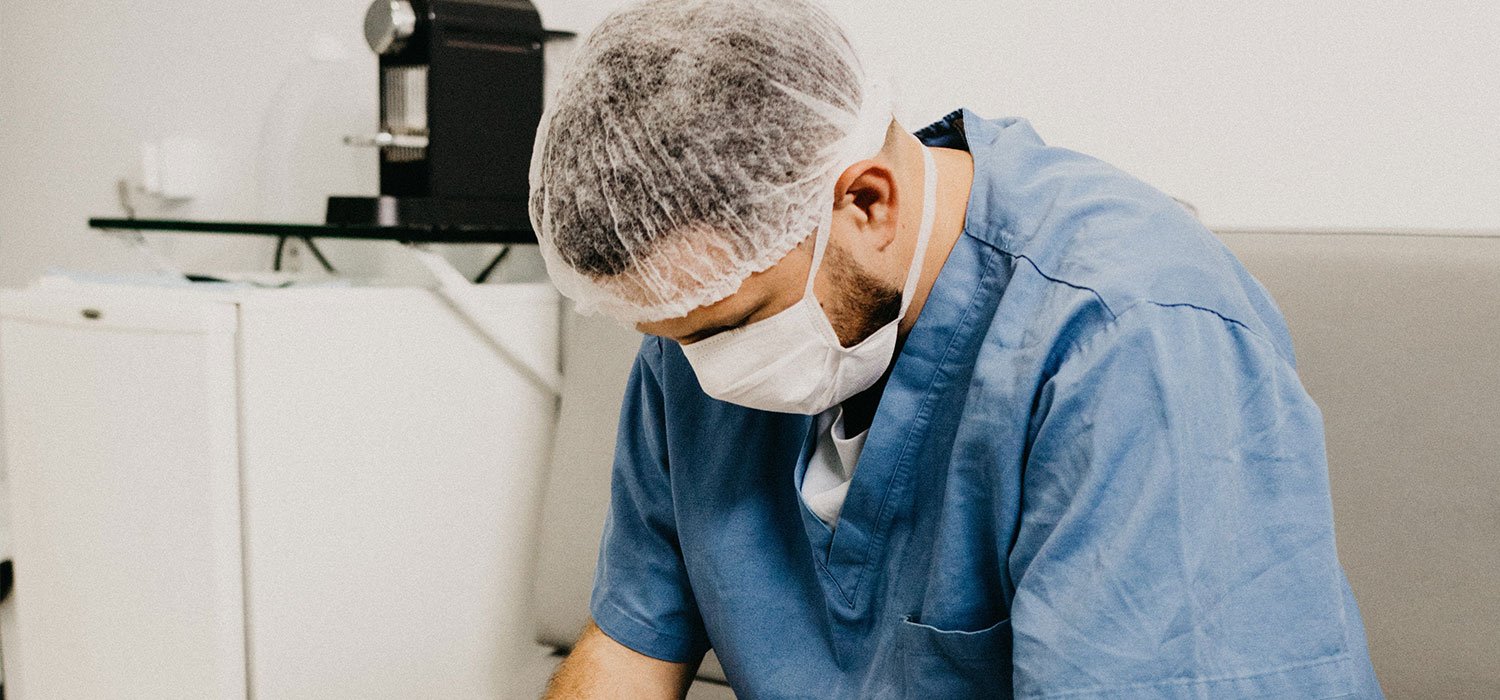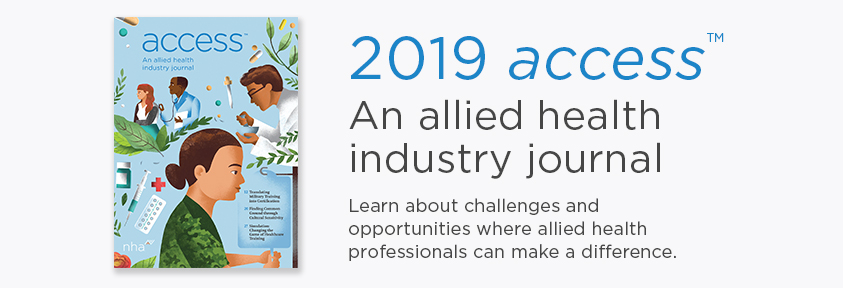The 2020 and future allied health program graduates—medical assistants, phlebotomy technicians, patient care technicians, and others—find themselves in an unfathomable position as they prepare to enter the healthcare workforce during the COVID-19 crisis.
On one hand, they're crossing the finish line and about to enter the career they've worked so hard for. On the other, they're entering the frontlines of the war against the virus.
It's a lot to process, and healthcare educators and employers have a role to play in mentally preparing these new healthcare workers for this new healthcare environment. Here's a look at some of the stresses incoming frontline healthcare workers may be experiencing, and some guidance on ways they can help manage that stress.
Sources of stress new healthcare find themselves facing
Disappointment of missing milestones
The graduating class of 2020—those completing high school, career training programs, or college—didn't get to experience any traditional graduation ceremonies. And in the world of healthcare education, many students' time spent participating in hands-on learning opportunities were cut short or didn't happen at all. These clinical experiences are often big stepping stones, and give students confidence before entering the field.
Wendy Davenport, Health Science Instructor at Walker County Center of Technology, said disappointment is what she notices most in her seniors this year. "I think there's been disappointment more than anything. Disappointment in missing out on the milestones that you look forward to taking part in from the time you start junior high," she says.
The transition from student to hero
The timing is strange, to say the least, but completing a healthcare program and getting certified are achievements to be proud of... especially now. What has always been seen as a noble profession is now underscored with patriotism. By embarking their healthcare career during a global pandemic, they are truly heroes, and they must adjust not only to starting a new career (already a stressful and exciting time), but also to this patriotic duty to serve their communities.
Dr. Michelle Fynan, a Licensed Mental Health Counselor and university instructor teaching Behavioral Science online and providing relationship counseling and coaching virtually in private practice, says that some will be energized by this opportunity to help on the frontlines, while others may question why they entered the field at all.
We want YOU — doctors, nurses, and anyone with medical training!
— NYC Mayor's Office (@NYCMayorsOffice) April 5, 2020
New York City needs all the help we can get. Join the Medical Reserve Corps.https://t.co/4wSdgsMxxx pic.twitter.com/fe1583cSAE
A fear of infection
With hospitals and healthcare workers reporting a critical shortage of personal protective equipment (PPE), current and incoming healthcare professionals struggle with a fear of infection. Not only do they fear personal infection, but also fear infecting people they love. Many healthcare professionals are making difficult decisions to self-isolate, staying away from their loved ones, including elderly parents. Some are even choosing to send their children to family members' homes where they have less risk of exposure.
My spouse is a physician in the emergency dept, and is actively treating #coronavirus patients. We just made the difficult decision for him to isolate & move into our garage apartment for the foreseeable future as he continues to treat patients. (1/5)
— Rachel Patzer, PhD (@RachelPatzerPhD) March 17, 2020
Childcare challenges
For healthcare workers who have children, fear of infection isn't the only source of stress when it comes to family. Childcare centers and schools have closed their doors due to social distancing directives, making it challenging to obtain childcare for single parents or households where all adults are essential workers. Exacerbating the problem is the stigma attached to healthcare and essential workers—babysitters are afraid of risking infection by watching children in these households. Almost 3.5 million children of healthcare employees are in need of childcare. While employers, healthcare leaders and government officials work to address this issue, some say they just have to take it one day at a time.
Developing new skills on-the-fly
The pandemic has changed the healthcare system. Healthcare professionals at every level are having to quickly adapt and adjust based on the novel virus, and the evolving policy changes that have followed.
This need for new skills is evident even for offices that don't treat coronavirus patients. Telemedicine, which was once resisted because of factors like lack of reimbursement, is now being used by healthcare providers around the world, and administrative staff must quickly learn new processes and systems to keep up.
Using the top of their credential, immediately
Typically when you start a new job, there's some easing in. You get to know the office, and slowly take on more responsibilities. With the current crisis, that luxury has likely vanished in most offices. Instead, new healthcare workers are immediately thrown into the fire, and must use everything they learned in their certification program immediately.
Dr. William Wainwright, Chancellor of Northshore Technical Community College (NTCC), an institution that educates many frontline healthcare workers, talked about this in a recent interview with Louisiana local radio station Lake 94.7:
“It’s a balance of an exciting time certainly for those who’ve made the conscious decision to join a noble profession and truly save lives. While it’s exciting, many of them are experiencing some protocols that for decades have really been only taught in textbooks. So they are seeing some things come to fruition that’s really sobering and most important exposing them fully to their profession.” - Dr. Wainwright, NTCC
"Normal" stress of starting a new career
We are hard-wired to be anxious at a new job. A new job in a new field is even more pressure. Even if you welcome the life change and are excited about the opportunity, you still want to make a good first impression, excel at your new duties, etc. Something wonderful can also be stressful.
"It’s important for us to realize that stress even occurs from a positive life change. So, these newly graduated healthcare workers will have the stress related to transitioning from student to professional on top of all of the additional stressors of being in healthcare during a pandemic," says Dr. Fynan.
How to mentally prepare future entry-level healthcare workers
Acknowledge and understand the signs of stress
It's important to validate the stress that new entry-level healthcare workers may be experiencing. It's also important for the workers themselves to be able to recognize signs of stress so that they can respond appropriately. SAMHSA outlines the following signs of stress for first responders:
- Bodily sensations and physical effects such as rapid heart rate, headaches, nausea, inability to relax when off duty, trouble falling asleep or staying asleep
- Strong negative feelings
- Difficulty thinking clearly
- Problematic or risky behaviors
- Social conflicts
Ask them what they need
"The best way to offer support is to go directly to the population you are trying to serve and to ask what they need," says Dr. Fynan. "Even as someone who is in a helping profession, I can’t fathom what these healthcare workers are experiencing when it comes to the stress they are under. We must allow them to share their experiences with us, listen to them, hear them, and do our best to meet those needs."
Emphasize the importance of self-care
Promoting self-care during the pandemic can be challenging when healthcare workers may prioritize the needs of others over their own. Here's what the World Health Organization (WHO) advises to healthcare workers regarding mental health considerations:
"Take care of yourself at this time. Try and use helpful coping strategies such as ensuring sufficient rest and respite during work or between shifts, eat sufficient and healthy food, engage in physical activity, and stay in contact with family and friends. Avoid using unhelpful coping strategies such as use of tobacco, alcohol or other drugs. In the long term, these can worsen your mental and physical well-being. The COVID-19 outbreak is a unique and unprecedented scenario for many workers, particularly if they have not been involved in similar responses. Even so, using strategies that have worked for you in the past to manage times of stress can benefit you now. You are the person most likely to know how you can de-stress and you should not be hesitant in keeping yourself psychologically well. This is not a sprint; it’s a marathon."
Fight stress through preparedness
The VA recommends "fighting stress through preparedness" by training healthcare workers in specific COVID-19 efforts. An entry-level healthcare worker may feel less stressed if they understand what they are supposed to do in different scenarios rather than flying blind. Some specific areas the VA suggests training in include:
- specific details about transmission of the COVID-19 virus
- when and how to screen patients and, potentially, family members
- the use of personal protective equipment
- when to invoke quarantine and isolation
- implementing all levels of quarantine
- enforcing movement restrictions
- coping with high stress demands
- preparing for the needs of their families if workers are required to be more engaged at work or quarantined
Whether or not a new healthcare worker will be directly meeting with COVID-19 patients, being prepared in other aspects of the job is also important and can help reduce the stress related to starting a new career.
When asked how this new class can mentally prepare to enter the field, Davenport says that her students have been working hard and preparing all year. "By the time their externship starts, they know they have done what it took to prepare. They have demonstrated they know can do what it takes to be employable. I think they can mentally prepare by looking back at what they have experienced and accomplished up to this point and say, 'I am ready!'"




